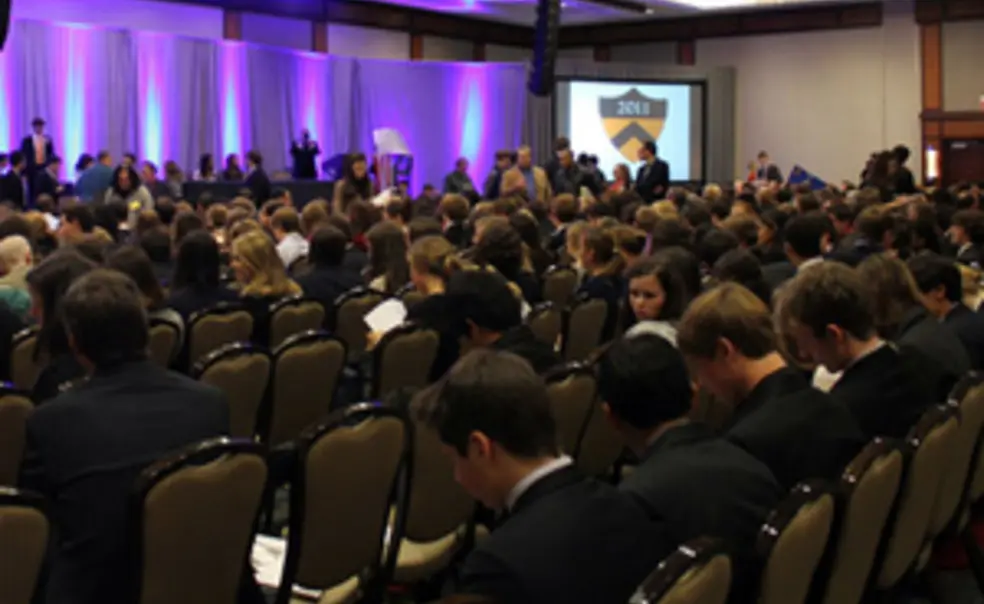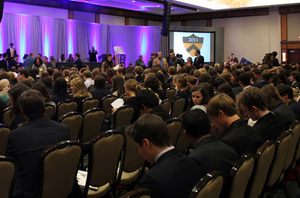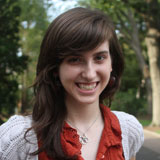Undergrads lead model congress for hundreds of high school students
More than 950 students attended the 30th-anniversary conference of the Princeton Model Congress in Washington, D.C. (Emily Trost '13)
Seventeen young men and women dressed in button-down shirts and business attire quietly took their seats at a long, narrow table in a conference room just down the street from the white dome of the U.S. Capitol. They opened their binders and began sorting bills and resolutions they planned to discuss for the next few hours. A gavel banged on the table.
“The chair will now look favorably on a motion to open the docket.”
A young woman in a white blouse waved her name placard. “Motion to open the docket,” she offered.
“Is there a second? All in favor?” asked the chairwoman.
Seventeen placards shot up into the air. Gavel in hand, Molly Nacey ’13 smiled at the group from the head of the table. “The chair will now entertain ‘The No-Fly List Notification Act,’” she said. “Please take a few minutes to read it over.”
The room quieted to the sounds of rustling papers and pen scratches as 17 high school students from across the country prepared to debate the proposed legislation with Nacey moderating the discussion.
For Nacey, it was her first time chairing a committee at the Princeton Model Congress (PMC) conference, a three-day, student-run program held in Washington, D.C. Designed to be educational, fun, and transformative for high school students, the conference, now in its 30th year, invites students to step into the shoes of U.S. congressmen and women, Supreme Court justices, cabinet members, members of the press, and others involved with the political process.

Jim Leach '64, a former congressman and current chairman of the National Endowment for the Humanities, delivers his address as Chris Greco '13 looks on. (Emily Trost '13)
Organized by 19 Princeton undergraduate officers and staffed by an additional 60 undergraduate volunteers, the gathering was held Nov. 17-19, after over a year of preparation. More than 950 high school students from 39 schools attended.
The high school students separated into committees of about 15 to 20 students to debate and discuss bills that they had prepared individually before the conference. Princeton undergraduates led these sessions as chairs, following parliamentary procedure and maintaining a professional atmosphere.
PMC officers stressed that giving the high school students the experience of respectful debate was what mattered most. Speaking from past experience as a high school delegate, PMC’s co-executive director Chris Greco ’13 said, “You find out the most about yourself when you get to speak with these other students.”
The committees met four times for three-hour periods over the weekend, allowing the Princeton students a chance to get to know the high school students in their group. “I was in awe of the dedication and genuine interest these high school students showed for American politics,” Nacey said. “I loved seeing their confidence rise and the debates become increasingly thought-provoking as the conference went on.”
Students could write and argue for positions on nearly any current issue they felt passionate about. The topics of their bills ranged from supporting sustainable transportation initiatives to punishing bullying in public schools.
The students were exposed to professionals outside their committee sessions. They toured Washington, and some, with the help of Princeton alumni, made special visits to the offices of the Supreme Court and the headquarters of The Washington Post. On the final day of the conference, former congressman and current chairman of the National Endowment for the Humanities Jim Leach ’64 spoke to the group, stressing the importance of the liberal arts education he received at Princeton and encouraging the students to look beyond political parties for solutions to national and global issues.
Kate Porterfield, a sophomore from The Key School in Annapolis, Md., enjoyed her first conference, especially the intimate discussion allowed by small committee sessions. “Everyone is so engaged, and there is really consistent and stimulating debate,” she said. “I didn’t think I was into politics at all before this.”
Many of the PMC officers had once been in the seats of those high school students. “It was one of the most exciting trips of the year, and most of [my] school wanted to go,” co-executive director Matthew Dolan ’13 remembered.
Dolan believed his staff’s biggest success was keeping the logistical headaches of the event hidden from the high school students. “The conference is at such a huge scale that doing almost anything becomes a major task — from creating a bill book to even distributing T-shirts,” he said. “Princeton students put a great deal of effort into making the whole experience seem effortless.”
Emily Trost ’13 is a geosciences major from Huntingdon Valley, Pa.














No responses yet